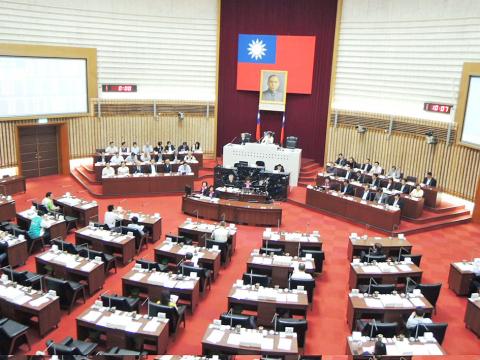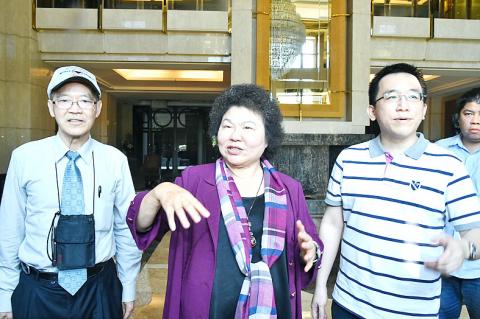The Presidential Office has rejected a renewed call from local governments to pardon former president Chen Shui-bian (陳水扁), saying there are still ongoing criminal cases involving Chen.
“Presidential pardon is an issue that will only be considered after a final verdict has been reached. However, a number of criminal cases against Chen are still going on,” the Presidential Office said in a statement released yesterday.
The office issued the statement shortly after the Kaohsiung City Council passed a motion proposed by the council’s Democratic Progressive Party (DPP) caucus urging President Ma Ying-jeou (馬英九) to grant a pardon to Chen before his term ends on May 20, which it said could facilitate rapprochement between the pan-blue and pan-green camps.

Photo Wang Jung-hsiang, Taipei Times
The motion was signed by 39 city councilors, four of whom are not members of the DPP.
Kaohsiung City Council Speaker Kang Yu-cheng (康裕成) of the DPP said the motion is a catalyst for “blue-green reconciliation.”
The Tainan City Council passed a similar motion proposed by two independent and two DPP city councilors on Wednesday last week, which garnered the support of 34 of the 56 participating city councilors.

Photo: Chang Chung-i, Taipei Times
On Monday last week, the Foundation of Medical Professionals Alliance in Taiwan also called for a presidential pardon for Chen, saying that the former president’s illnesses, including sleep apnea, suspected Parkinson’s disease and osteoporosis, could put his life at risk.
Speaking on the sidelines of a Kaohsiung City Council meeting yesterday, Kaohsiung Mayor Chen Chu (陳菊), a DPP member, said she approved of the motion, calling on Ma to make an effort to assuage Taiwan’s political confrontations and break through the blue-green divide.
“I believe the motion submitted by the DPP caucus urging Ma to pardon Chen Shui-bian can help achieve social harmony... Ma’s willingness to handle the matter as a president will be extremely conducive to Taiwan’s development,” Chen Chu said.
Later yesterday, Chen Chu and former minister of health Lee Ming-liang (李明亮) accompanied vice president-elect Chen Chien-jen (陳建仁) on a visit to Chen Shui-bian in Kaohsiung, where the former president is living.
Chen Shui-bian, who was in office from 2000 to 2008, has served more than six years of a 20-year prison term for several convictions on corruption charges.
Medical parole granted to the former president has been extended five times since he was first granted compassionate release in January last year. The former president’s health is re-evaluated every three months, with his sixth parole set to expire on May 4.
Meanwhile, Chen Shui-bian’s son, Chen Chih-chung (陳致中), yesterday posted a message on Facebook, thanking the public, the medical alliance and the Tainan and Kaohsiung city councils for showing concern for his father’s health.
“Restoring my father’s health, reputation and freedom is always on the minds of my grandmother and my other relatives,” Chen Chih-chung said.
Additional reporting by Tsai Wen-chu and CNA.

Tropical Storm Gaemi strengthened into a typhoon at 2pm yesterday, and could make landfall in Yilan County tomorrow, the Central Weather Administration (CWA) said yesterday. The agency was scheduled to issue a sea warning at 11:30pm yesterday, and could issue a land warning later today. Gaemi was moving north-northwest at 4kph, carrying maximum sustained winds near its center of up to 118.8kph and gusts of 154.8kph. The circumference is forecast to reach eastern Taiwan tomorrow morning, with the center making landfall in Yilan County later that night before departing from the north coast, CWA weather forecaster Kuan Shin-ping (官欣平) said yesterday. Uncertainty remains and

SEA WARNING LIKELY: The storm, named Gaemi, could become a moderate typhoon on Wednesday or Thursday, with the Taipei City Government preparing for flooding A tropical depression east of the Philippines developed into a tropical storm named Gaemi at 2pm yesterday, and was moving toward eastern Taiwan, the Central Weather Administration (CWA) said. Gaemi could begin to affect Taiwan proper on Tuesday, lasting until Friday, and could develop into a moderate typhoon on Wednesday or Thursday, it said. A sea warning for Gaemi could be issued as early as Tuesday morning, it added. Gaemi, the third tropical storm in the Pacific Ocean this typhoon season, is projected to begin moving northwest today, and be closest to Taiwan on Wednesday or Thursday, the agency said. Today, there would likely

DISRUPTIONS: The high-speed rail is to operate as normal, while several airlines either canceled flights or announced early departures or late arrivals Schools and offices in 15 cities and counties are to be closed today due to Typhoon Gaemi, local governments announced last night. The 15 are: Taipei, New Taipei City, Taoyuan, Tainan, Keelung, Hsinchu and Kaohsiung, as well as Yilan, Hualien, Hsinchu, Miaoli, Chiayi, Pingtung, Penghu and Lienchiang counties. People should brace for torrential rainfall brought by the storm, with its center forecast to make landfall on the east coast between tonight and tomorrow morning, the Central Weather Administration (CWA) said. The agency issued a sea warning for the typhoon at 11:30pm on Monday, followed by a land warning at 11:30am yesterday. As of

CASUALTY: A 70-year-old woman was killed by a falling tree in Kaohsiung as the premier warned all government agencies to remain on high alert for the next 24 hours Schools and offices nationwide are to be closed for a second day today as Typhoon Gaemi crosses over the nation, bringing torrential rain and whipping winds. Gaemi was forecast to make landfall late last night. From Tuesday night, its outer band brought substantial rainfall and strong winds to the nation. As of 6:15pm last night, the typhoon’s center was 20km southeast of Hualien County, Central Weather Administration (CWA) data showed. It was moving at 19kph and had a radius of 250km. As of 3pm yesterday, one woman had died, while 58 people were injured, the Central Emergency Operation Center said. The 70-year-old